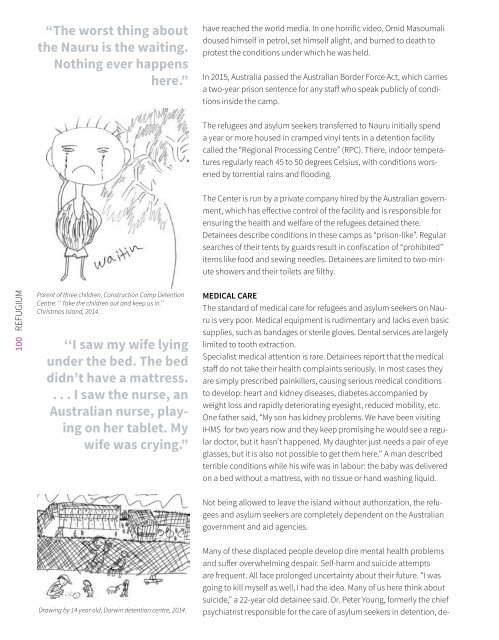Create successful ePaper yourself
Turn your PDF publications into a flip-book with our unique Google optimized e-Paper software.
“The worst thing about<br />
the Nauru is the waiting.<br />
Nothing ever happens<br />
here.”<br />
have reached the world media. In one horrific video, Omid Masoumali<br />
doused himself in petrol, set himself alight, and burned to death to<br />
protest the conditions under which he was held.<br />
In 2015, Australia passed the Australian Border Force Act, which carries<br />
a two-year prison sentence for any staff who speak publicly of conditions<br />
inside the camp.<br />
The refugees and asylum seekers transferred to Nauru initially spend<br />
a year or more housed in cramped vinyl tents in a detention facility<br />
called the “Regional Processing Centre” (RPC). There, indoor temperatures<br />
regularly reach 45 to 50 degrees Celsius, with conditions worsened<br />
by torrential rains and flooding.<br />
The Center is run by a private company hired by the Australian government,<br />
which has effective control of the facility and is responsible for<br />
ensuring the health and welfare of the refugees detained there.<br />
Detainees describe conditions in these camps as “prison-like”. Regular<br />
searches of their tents by guards result in confiscation of “prohibited”<br />
items like food and sewing needles. Detainees are limited to two-minute<br />
showers and their toilets are filthy.<br />
100 REFUGIUM<br />
Parent of three children, Construction Camp Detention<br />
Centre: ‘’ Take the children out and keep us in.’’<br />
Christmas Island, 2014.<br />
‘‘I saw my wife lying<br />
under the bed. The bed<br />
didn’t have a mattress.<br />
. . . I saw the nurse, an<br />
Australian nurse, playing<br />
on her tablet. My<br />
wife was crying.”<br />
MEDICAL CARE<br />
The standard of medical care for refugees and asylum seekers on Nauru<br />
is very poor. Medical equipment is rudimentary and lacks even basic<br />
supplies, such as bandages or sterile gloves. Dental services are largely<br />
limited to tooth extraction.<br />
Specialist medical attention is rare. Detainees report that the medical<br />
staff do not take their health complaints seriously. In most cases they<br />
are simply prescribed painkillers, causing serious medical conditions<br />
to develop: heart and kidney diseases, diabetes accompanied by<br />
weight loss and rapidly deteriorating eyesight, reduced mobility, etc.<br />
One father said, “My son has kidney problems. We have been visiting<br />
IHMS for two years now and they keep promising he would see a regular<br />
doctor, but it hasn’t happened. My daughter just needs a pair of eye<br />
glasses, but it is also not possible to get them here.’’ A man described<br />
terrible conditions while his wife was in labour: the baby was delivered<br />
on a bed without a mattress, with no tissue or hand washing liquid.<br />
Not being allowed to leave the island without authorization, the refugees<br />
and asylum seekers are completely dependent on the Australian<br />
government and aid agencies.<br />
Drawing by 14 year old, Darwin detention centre, 2014.<br />
Many of these displaced people develop dire mental health problems<br />
and suffer overwhelming despair. Self-harm and suicide attempts<br />
are frequent. All face prolonged uncertainty about their future. “I was<br />
going to kill myself as well, I had the idea. Many of us here think about<br />
suicide,” a 22-year old detainee said. Dr. Peter Young, formerly the chief<br />
psychiatrist responsible for the care of asylum seekers in detention, de-




